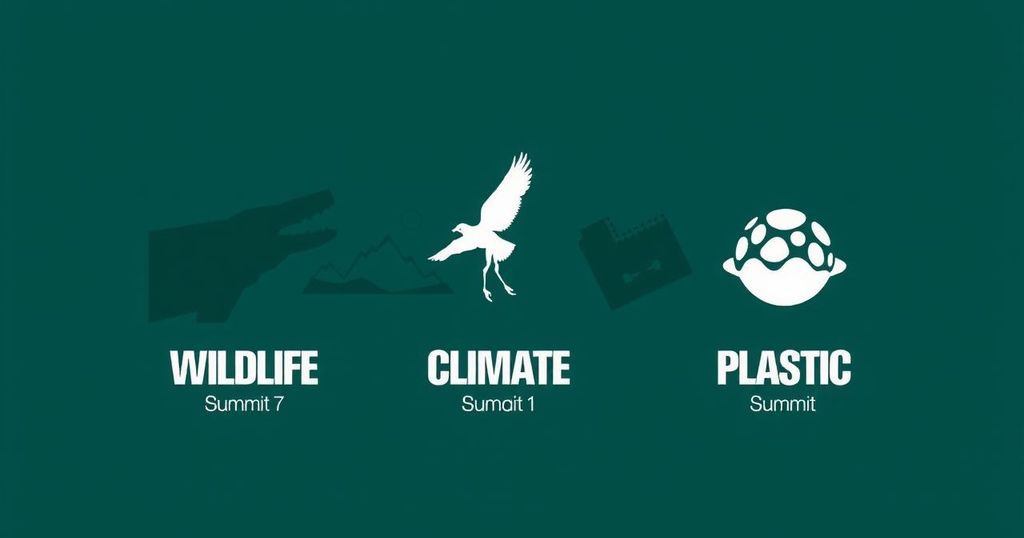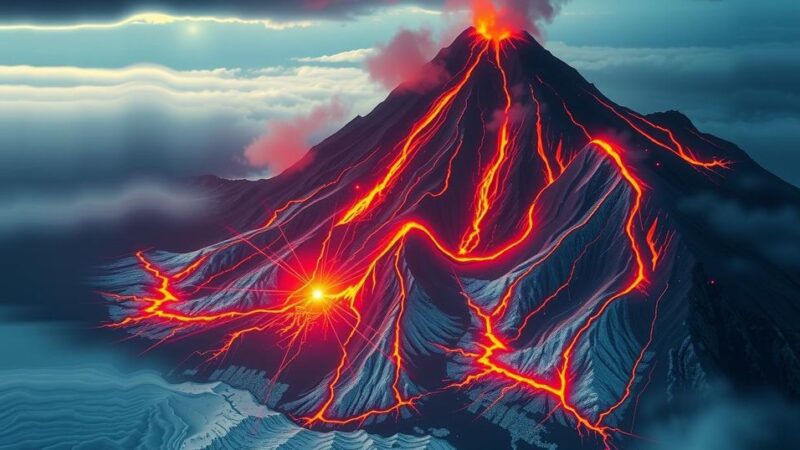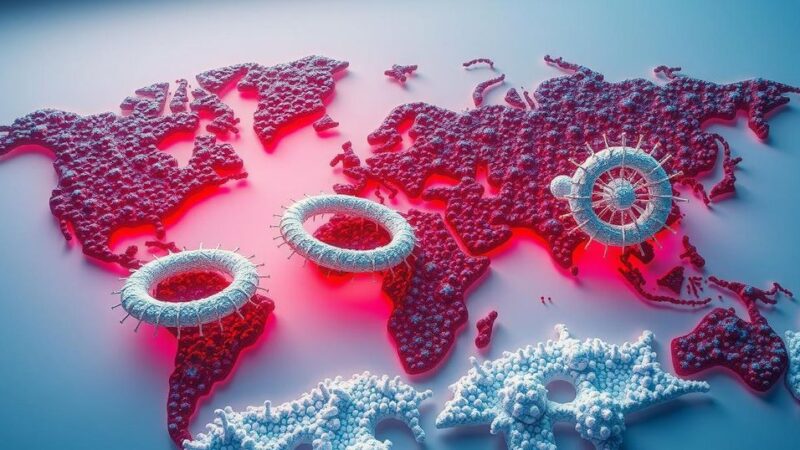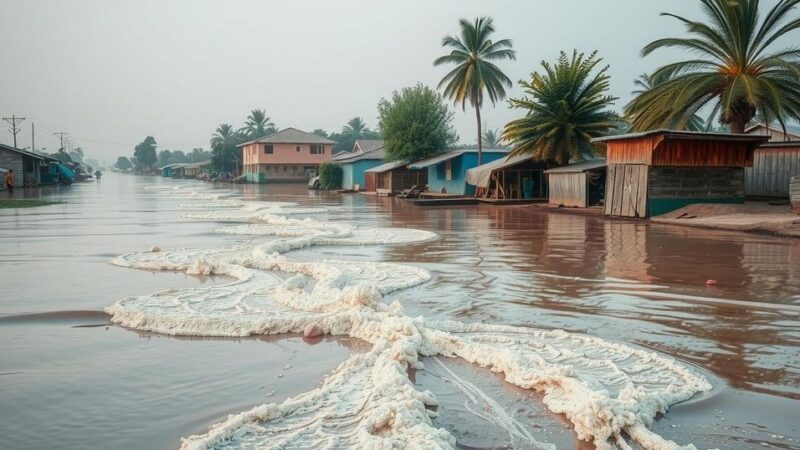As nearly 200 nations prepare for three summits in 2024, the focus will be on addressing interconnected crises: biodiversity loss, climate change, and plastic pollution. With targets set to protect significant portions of the planet, experts assert that these issues require comprehensive action, emphasizing their interrelatedness. As climate change heightens ecological stresses and wildlife populations decline at alarming rates, the urgency to address these challenges grows. Scientists advocate for addressing root causes affecting natural habitats, and the need for decisive measures against plastic pollution further underscores the critical nature of upcoming discussions.
In the upcoming months leading to the end of 2024, nearly 200 nations are scheduled to convene at three critical international summits aimed at addressing urgent global crises: biodiversity loss, climate change, and plastic pollution. These summits underscore the interconnectivity of these significant concerns, which demand immediate and coordinated action from a global perspective. Next week, Colombia will facilitate a conference to assess the progress made on the ambitious goal of protecting 30% of terrestrial and marine ecosystems by the year 2030. This will be followed by COP29 in Azerbaijan, where nations are expected to revisit their previous commitments made at last year’s conference in Dubai, specifically regarding the gradual phasing out of fossil fuels that are pivotal in exacerbating climate degradation. Lastly, South Korea will host discussions in December that may lead to the first global agreement targeting the rampant issue of plastic waste. The insightful perspective from biologist Liette Vasseur (Brock University), political scientist Anders Hayden (Dalhousie University), and ecologist Mike Jones (Swedish University of Agricultural Sciences) emphasizes that “Climate change, biodiversity loss and resource depletion are not isolated problems; they are part of an interconnected web of crises that demand urgent and comprehensive action.” The scientific community explicitly links the threats posed by climate change and biodiversity loss to the chronic stress placed on ecosystems, which in turn affects humanity’s ability to mitigate environmental challenges. Researchers Seth Wynes and H. Damon Matthews from the University of Waterloo and Concordia University poignantly articulate the uncertainty surrounding future climate scenarios, stating, “How hot is it going to get? This is one of the most important and difficult remaining questions about our changing climate.” They indicate an alarming trend where, even at a mere 1.3°C increase from pre-industrial levels, the planet has witnessed devastating impacts such as severe flooding, increased frequency of heat waves, and heightened wildfires. The sobering realization remains that sufficient action must be taken promptly to avoid reaching a perilous 2.7°C rise predicted by the end of the century. Moreover, the degradation of crucial ecosystem functions is evident. For instance, the World Wildlife Fund (WWF) has reported a staggering 73% decline in monitored vertebrate wildlife populations since 1970, illustrating an impending collapse of biodiversity that could destabilize vital ecological processes. Alexander Lees, a biodiversity scientist at Manchester Metropolitan University, emphasizes the inseparable role of wildlife in maintaining ecosystem integrity, stating, “More than 90% of tropical trees and shrubs depend on animals to disperse their seeds; these ‘biodiversity services’ are crucial.” Compounding these challenges is the pervasive issue of plastic pollution, which threatens both wildlife and environmental health. Karen Raubenheimer of the University of Wollongong notes the toxic effects of microplastics that now infiltrate even the most remote ecosystems, underscoring the critical need for synergistic solutions linking plastic pollution to fossil fuel use: “Every year without production caps makes the necessary cut to plastic production in future steeper—and our need to use other measures to address the problem greater.” Each summit is vital, addressing different facets of humanity’s detrimental impact on natural systems, yet there remains a call for more radical perspectives. Political ecologists Bram Büscher (Wageningen University) and Rosaleen Duffy (University of Sheffield) challenge the effectiveness of merely protecting 30% of Earth’s areas, arguing that past efforts have often overlooked deeper systemic issues fueling biodiversity loss. This situation calls for a comprehensive evaluation of humanity’s economic frameworks, which prioritize expansion over environmental sustainability. The urgency of such summits cannot be overstated, as they represent a crucial juncture in charting a sustainable path forward for both human and ecological communities.
The article addresses three impending global summits focused on interlinked environmental crises pressing on humanity: the decline in biodiversity, the accelerated effects of climate change, and the rising threat of plastic pollution. Diverse and impactful discussions aim to remedy the growing divide between nature and human activity. The urgency surrounding these conferences arises from the alarming state of ecological health driven by anthropogenic factors, indicated by scientific data illustrating drastic declines in wildlife populations and the challenges posed by emissions from fossil fuels and plastic waste.
The upcoming international conferences represent a pivotal opportunity for nations to consolidate efforts against interrelated environmental crises. Highlighting the intertwining nature of climate change, biodiversity loss, and plastic pollution, experts underscore that comprehensive and immediate action is vital for the rehabilitation and preservation of global ecosystems. The need to address systemic economic practices harmful to nature resonates throughout discussions, emphasizing that effective conservation cannot merely focus on protected areas, but must also challenge the underlying causes of ecological degradation.
Original Source: phys.org







